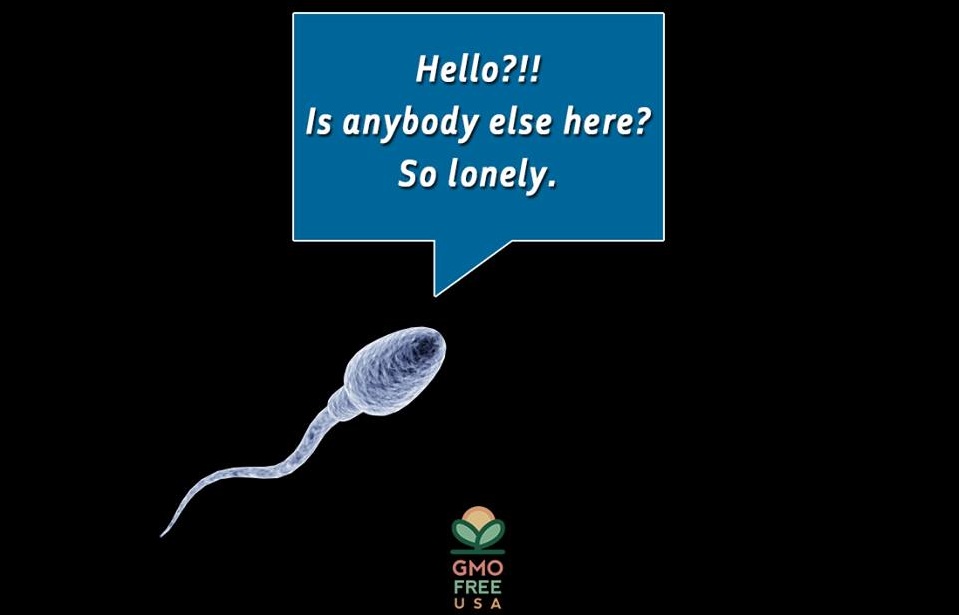The world is on the edge of an ‘infertility disaster’ with the global sperm count having crashed over the past few decades. Is Roundup partly to blame?

Brazilian scientists released a shocking study at the end of June 2013, which largely went under the scientific and media radar, showing that the Glyphosate based herbicide Roundup may well be one of the main causes of the terrible state of the human male sperm count worldwide: only between 5 and 15 per cent of human males’ sperm is, on average, good enough to be classed as “normal” under strict World Health Organisation rules – and these are young, healthy men.
The Brazilian study by researchers at the University of Santa Catarina, titled Roundup Disrupted Male Reproductive Functions By Triggering Calcium-Mediated Cell Death In Rat Testis And Sertoli Cells, showed that “acute Roundup exposure at low doses (36ppm, 0.036g/L) for 30min induces oxidative stress and activates multiple stress-response pathways leading to Sertoli cell death in prepubertal rat testis.”
The introduction to the study concluded: “Glyphosate has been described as an endocrine disruptor affecting the male reproductive system; however, the molecular basis of its toxicity remains to be clarified. We could propose that Roundup toxicity, implicating in Ca2+ overload, cell signaling misregulation, stress response of the endoplasmic reticulum and/or depleted antioxidant defenses could contribute to Sertoli cell disruption of spermatogenesis that could impact male fertility.”
The Sperm Situation
As many as one in five healthy young men between the ages of 18 and 25 produce abnormal sperm counts. Even the sperm they do produce is often of poor quality. In fact only between 5 and 15 per cent of their sperm is, on average, good enough to be classed as “normal” under strict World Health Organisation rules – and these are young, healthy men. By contrast, more than 90 per cent of the sperm of a domestic bull or ram, or even laboratory rat, are normal.
Human males also suffer a disproportionately high incidence of reproductive problems, from congenital defects and undescended testes to cancer and impotency. As these also affect fertility, it’s a minor miracle men are able to sire any children at all. In fact, an increasing number of men are finding themselves childless. Among the one in seven couples now classed as infertile, the “male factor” has been found to be the most commonly identified cause.
2011 marked the 20th anniversary of the WHO conference where a Danish scientist first alerted the world to the fact that Western men are suffering an infertility crisis. Professor Niels Skakkebaek of the University of Copenhagen presented data indicating sperm counts had fallen by about a half over the past 50 years. Sperm counts in the 1940s were typically well above 100m sperm cells per millilitre, but Professor Skakkebaek found they have dropped to an average of about 60m per ml. Other more recent studies have found that between 15 and 20 per cent of young men now find themselves with sperm counts of less than 20m per ml, which is technically defined as abnormal. In contrast, a dairy bull has a viable sperm count in the billions.
GMWatch concluded earlier today that “in light of the falling fertility levels in the US and Europe, as well as the reports of infertility in people living in GM Roundup Ready soy producing areas of Argentina, governments must step up to implement programs to phase out the use of Roundup.”
Pic Credits: GMO Free USA















Phase out? i am thinking immediately BAN!
I agree immediately ban this stuff.
LIFE on planet earth requires a ban on GLYPHOSATE, and all glyphosate (ROUND-up) products. Local councils must stop spraying herbicides. Food is being poisoned.
Tomorrow is too late for a ban on Glyphosate!
are there countries where roundup has been banned for a while and if so what are the sperm counts like there ?
You all realize that they tested these effects by putting rats’ testes in a petri dish and applying the glyphosate solution to them directly, right? At best, these results tell us that the chemicals *may* have an effect, and that more study is needed.
But all of that is moot since glyphosate doesn’t accumulate in the body – meaning even if we are consuming trace amounts, it passes through our system with little to no interaction.
http://www.geneticliteracyproject.org/2014/04/30/is-glyphosate-used-with-some-gm-crops-dangerously-toxic-to-humans/#.U4XyDfm-2m7